Today, the General Administration of Market Supervision issued a document saying that recently, according to the preliminary verification, the Municipal General Administration of supervision filed an investigation on the suspected monopoly of HowNet according to law. In response, Tongfang shares, the parent company of HowNet, issued an announcement and responded that the wholly-owned subsidiary of HowNet Beijing and the wholly-owned subsidiary of HowNet digital publishing received the notice of the State Administration of market supervision on the investigation of monopoly cases from the State Administration of market supervision on May 13, 2022, and the state Administration of market supervision will start the antitrust investigation of HowNet Beijing and HowNet digital publishing on May 13, 2022. The company will firmly support and fully cooperate with the above investigation.
Tianlin four years: Xi Da Pu Ben
As soon as this news came out, it quickly boarded the microblog hot search. Netizens "like big and popular", applauded and applauded, just as the so-called "HowNet is difficult, all sides praise".
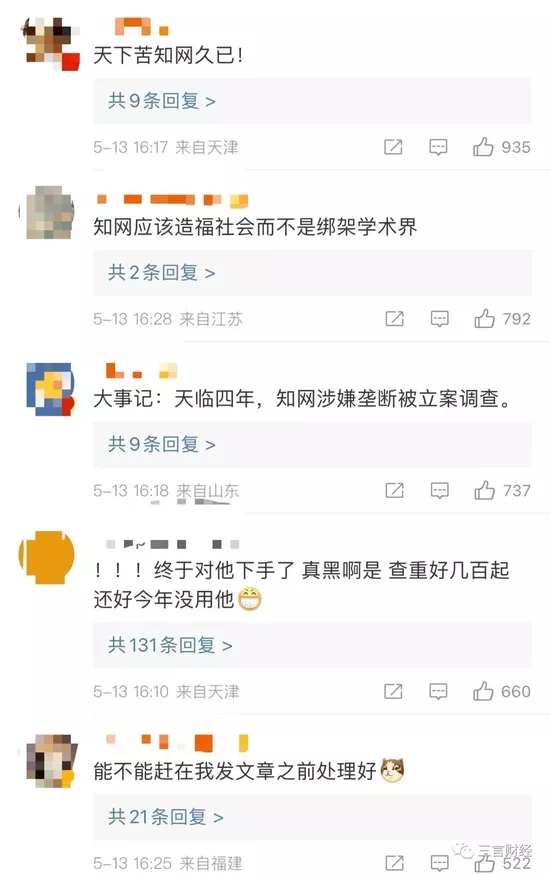
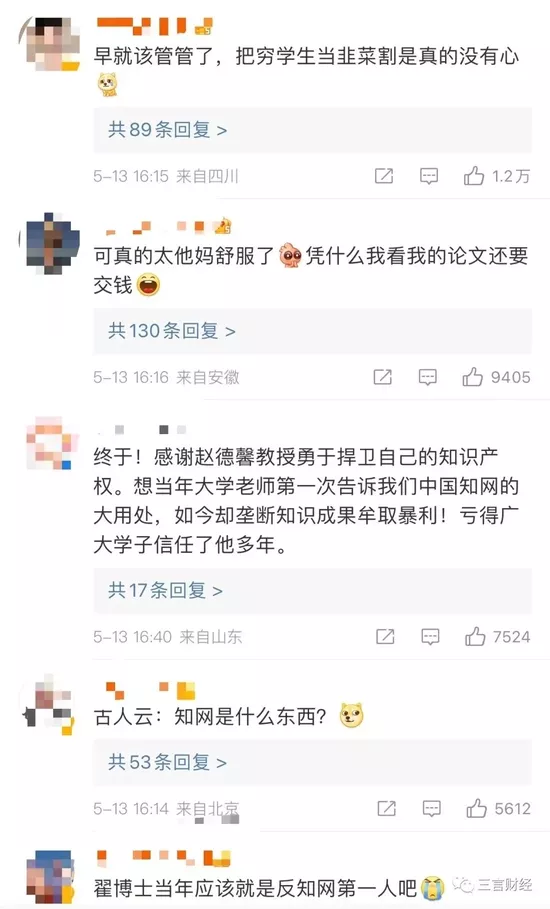
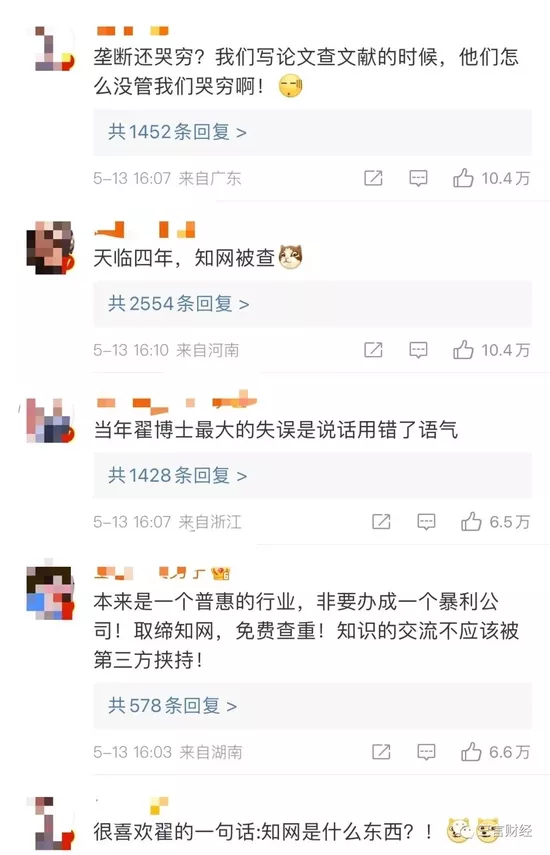
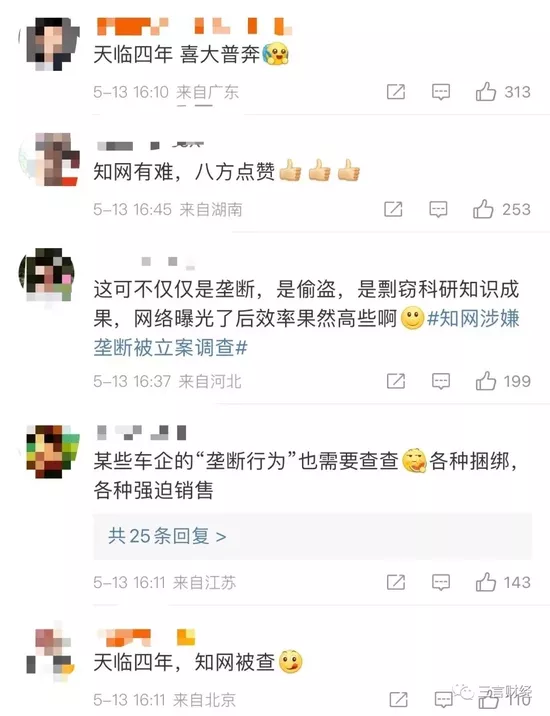
Three years ago, Zhai Tianlin was found guilty of academic fraud because of a sentence "what is the knowledge network"; Three years later, HowNet was investigated for monopoly.

Therefore, this year was also called "Tianlin four years" by netizens. Only then did we find that Zhai Tianlin was wrongly blamed. In fact, his sentence "HowNet is something" was in the wrong tone.
What is HowNet
In 1999, China Journal Network, the predecessor of HowNet, was initiated by Tsinghua University and Tsinghua Tongfang. The content construction of HowNet is undertaken by China Academic Journal (CD version) electronic magazine Co., Ltd., and the technology and services are undertaken by Tongfang HowNet (Beijing) Technology Co., Ltd.
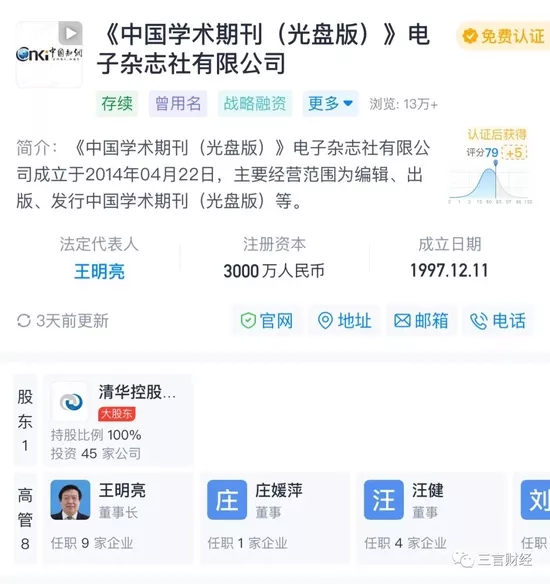
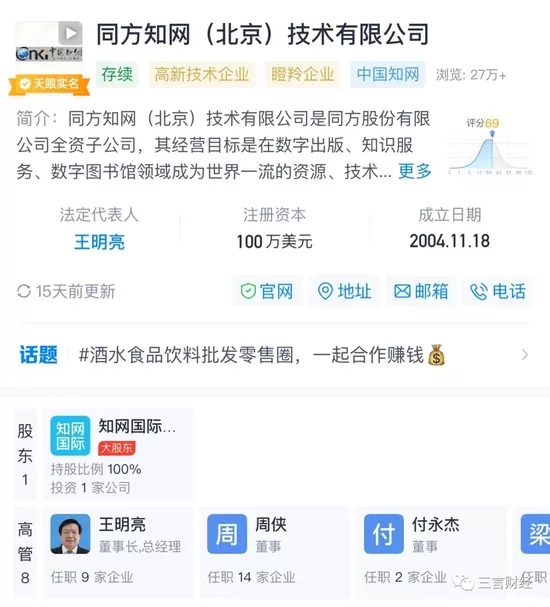
According to the industrial and commercial information, China Academic Journal (CD-ROM) electronic magazine Co., Ltd. is a wholly-owned subsidiary of Tsinghua Holding Co., Ltd., and the legal representative is Wang Mingliang; Tongfang HowNet is a wholly-owned subsidiary of Tongfang Co., Ltd. and its legal representative is Wang Mingliang.
China Academic Journal (CD-ROM version) electronic magazine is the largest and oldest professional Internet and electronic publishing organization in China, which is approved by the State Press and publication administration, in charge of the Ministry of education and sponsored by Tsinghua University.
HowNet has been established for more than 20 years. Its large-scale database has collected all kinds of academic documents and journals with dissemination value, and carried out digital publishing and dissemination. Objectively, HowNet has indispensable value in improving the efficiency of academic communication and promoting academic development.
So, over the past 20 years, how did HowNet come to this stage and almost become a "rat crossing the street and everyone yelling"?
Three sins of HowNet
First: suspected monopoly
Although the Municipal Administration of Supervision announced today that it was suspected of carrying out a monopoly investigation on HowNet, it is not too much to describe HowNet as an "academic monopoly".
According to the Beijing News, HowNet has a market share of 100% in Colleges and universities and 60% in other major markets. It has more than 60 million documents and core journals, with a yield of 99%.
In other words, as long as you enter Chinese universities, you must use HowNet. The Beijing News reported that a former employee of HowNet revealed that HowNet had already bought out the copyright of most journals and realized a monopoly.
Monopoly means you can "do whatever you want". After all, the pricing power is in your own hands.
The second crime: expensive
How expensive?
According to the data disclosed by Wuhan University of technology, the price of HowNet increased by more than 132.86% from 2010 to 2016, with an average annual increase of 18.98%.
In an interview, the person in charge of a university in Beijing revealed that the purchase price of HowNet often rises by millions, and increases by 5% - 10% every year;
According to the procurement transaction announcement of HowNet database disclosed by the bidding Center of Xiamen University, the transaction amount of the project in 2019 was 730000 yuan; 740000 yuan in 2020; RMB 2021.85 million;
According to the data of the bidding Office of Shanghai University of international business and economics, the transaction amount of the University's HowNet series database procurement project in 2017 was 287000 yuan; 440000 yuan in 2019; The total bid winning amount in 2020 is 470000 yuan; The bid winning amount in 2021 is 493000 yuan.
According to the publication of single source procurement of electronic resources (Chinese Library) procurement by Guangzhou University Library in 2022, the total price of HowNet CNKI is 1.1 million yuan; According to the announcement issued by Southwest University of political science and law, the budget of HowNet database is 1.7 million yuan; Renmin University of China's relevant announcement shows that the bid winning amount of HowNet is 1.6479 million yuan.
HowNet provides several different sub databases. The more subjects, the more sub databases the school wants to buy, and the higher the price; In addition, HowNet will also limit the number of simultaneous visits, so schools also need to choose different price gears according to the number of students in school.
The reason why the price of HowNet increases year by year is that HowNet digitizes and intelligently searches and processes paper data; At the same time, as the data will be added every year, the corresponding costs and prices will increase.
The former staff of HowNet said that the main profit source of HowNet is the academic journal products for universities and libraries, which is the core link of sales; In addition, labor cost is the largest expenditure of HowNet and one of the reasons for the price rise. HowNet has always adopted piecework salary to pay wages, and the operating cost is correspondingly higher.
The third crime: cutting leeks and even whoring for nothing
HowNet subscription is expensive, but the author's income is not high, or even no money at all.
The main sources of doctoral articles and master's articles in universities and colleges are known journals. Once the paper is published, the editorial department of the journal will obtain the copyright of the paper.
HowNet reached cooperation with the editorial department to obtain the publishing copyright of the database, and the author became an unrelated "third party". No matter how many articles are included by HowNet and how many clicks are generated, the author can't get the benefits.
According to media reports, when the doctoral thesis and master's thesis are published on HowNet, the author himself can only get 100 yuan in cash and 400 yuan worth of search and reading card as remuneration. But every time the author's paper is downloaded, the platform charges 15 yuan to 25 yuan.
The author can't make money, but as a large number of users, students have to pay service fees due to needs such as weight checking, which makes many students who have unstable economic sources and even rely on their parents miserable.
Countermeasures: the school is out of service and the author sues
After talking about the three crimes of HowNet, has everyone been "suffering" for many years? Is there no way to solve this situation?
Yes.
Kuzhiwang is not only poor students, but also schools and thesis writers can't stand it for a long time.
On April 8, the documentation and information center of the Chinese Academy of Sciences sent an email saying that due to the rising price of CNKI database year after year, the opening cost of the whole staff has been nearly ten million. The access of the Chinese Academy of Sciences to CNKI database has been suspended. From now on, CNKI scientific and technological journals and doctoral and master's thesis databases cannot be downloaded.
In addition, the documentation and information center of the Chinese Academy of Sciences has also conducted many rounds of arduous negotiations with HowNet, but HowNet did not let go of the renewal fee, which eventually forced the Chinese Academy of Sciences to stop using HowNet.
In fact, over the past decade or so, six colleges and universities, including Peking University, Wuhan University of technology and Nanjing Normal University, have announced the suspension of HowNet services because of the high rise in renewal fees.
The school can't stand HowNet, and many authors' rights and interests have been blatantly violated. Compared with Professor Zhao Dexin, who caused heated debate before, he sued HowNet.
In August 2020, Zhao Dexin, a retired professor of Zhongnan University of economics and law, found that more than 100 papers had been included by HowNet without knowledge. Readers need to pay to download. They not only have never received royalties, but also have to pay for their own articles. Professor Zhao Dexin then took the HowNet to court, and finally won the lawsuit, with a total loss of more than 700000 yuan.
This situation is by no means an exception. The legitimate rights and interests of Professor Zhou xiuluan, Professor Zhao Dexin's wife, have also been infringed by HowNet.
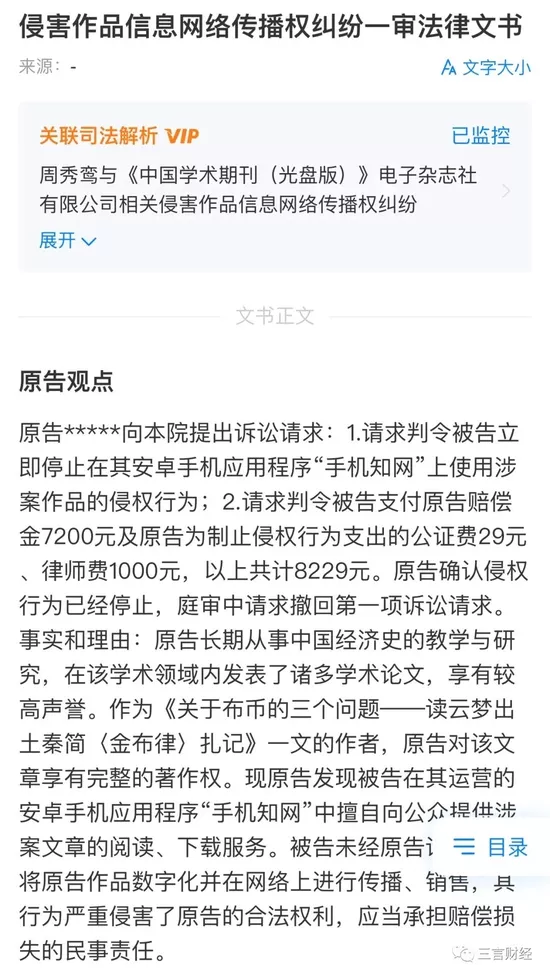
According to the judgment, the "mobile HowNet" app published ten articles written by Zhou xiuluan. Finally, the court ruled that HowNet had compensated Zhou xiuluan nearly 100000 yuan.
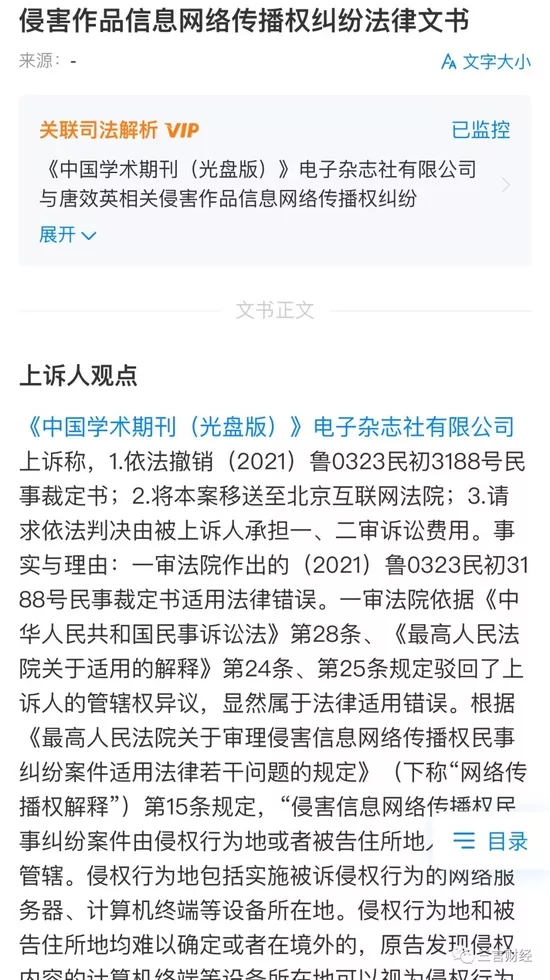
In addition to Zhao Dexin and Zhou xiuluan, writers Chen Yingsong, Dou Yingtai, Wang Bisheng, Cai Jianwen and Tang Xiaoying all filed a lawsuit with HowNet.
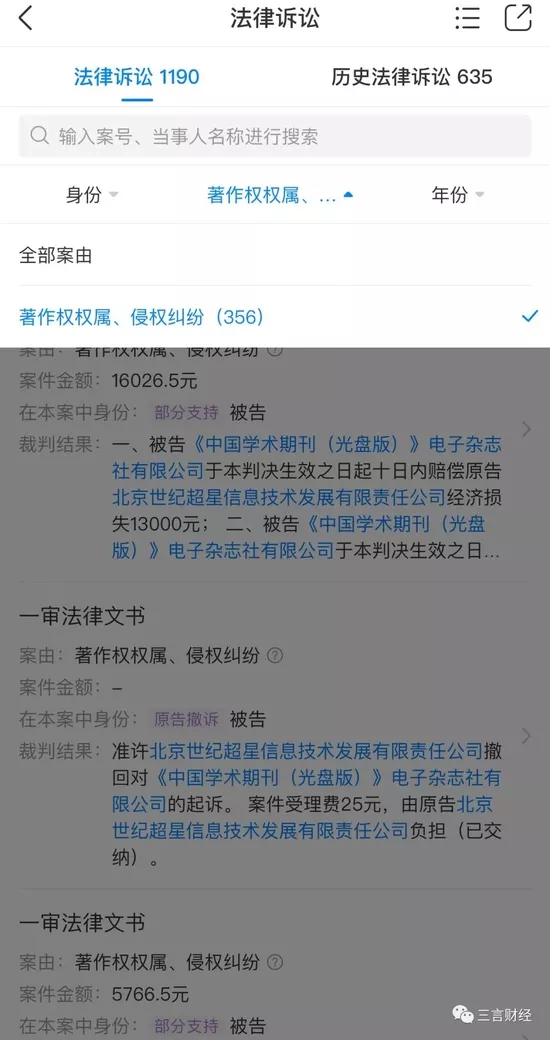
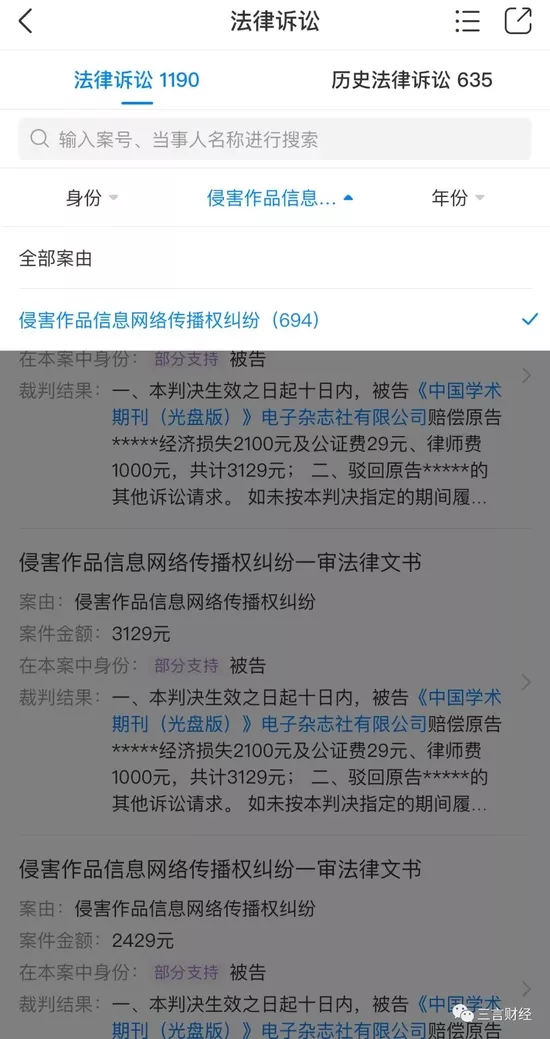
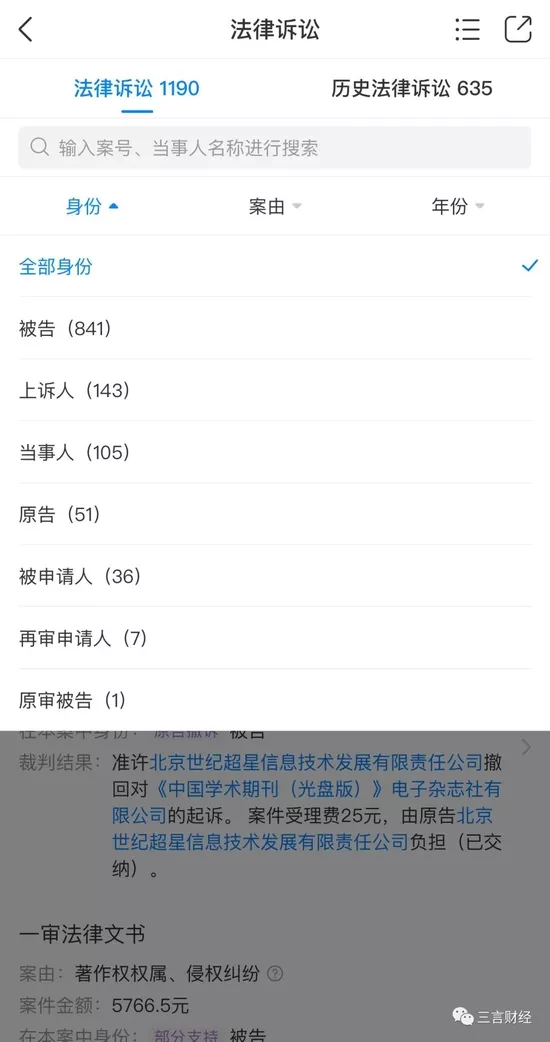
In fact, the copyright litigation cases involved in HowNet can be described as "hundreds and thousands".
According to tianyancha, China Academic Journal (CD version) e-magazine Co., Ltd. has involved nearly 800 infringement related lawsuits. Most of them respond to the lawsuit as defendants and Appellants, and most of these cases are lost by HowNet.
Not long ago, HowNet filed an appeal for "excessive compensation" after the first instance judgment of Zhou xiuluan case, but was finally rejected by the court. Since then, in Chen Yingsong's lawsuit, HowNet's agent also said that "according to the works of HowNet now in the library, the defendant needs to pay 120 billion yuan, which the defendant can't afford".
The huge compensation of 120 billion did not change the attitude of netizens, requiring HowNet to "compensate 120 billion first and then reflect".
Pain and compromise
However, even if some schools and institutions declare it out of service; Some authors rise up and sue; There are also a large number of students who continue to roast. The reality is that we may still have to compromise after scolding.
As mentioned earlier, the monopoly of HowNet is very high, and it is difficult to leave its "control".
At present, HowNet database has become an important target for university libraries and research institutions to purchase, and it is also an important way for academic researchers and students to consult literature. Academic work is inseparable from literature and papers, so it is difficult to leave HowNet.
According to the relevant procurement publicity of HowNet released by Zhejiang security vocational college, China Academic Journals (online edition), one of the only known sub databases, has collected more than 8540 journals as of January 20 this year, with a total of more than 60 million full-text documents.
Moreover, HowNet's "user experience" is also good. It provides good retrieval and download convenience. It can sort and process the content and retrieve it in a variety of ways.
More importantly, HowNet is the only academic electronic journal unit approved to officially publish doctoral dissertations, which has further established its authority and "monopoly".
It can be said that in addition to providing academic literature, it has become an "honor" for HowNet to upload articles to HowNet. With more and more people uploading papers, HowNet's database will be more comprehensive.
Therefore, it may be difficult for schools, authors and users to resist HowNet for a while.
Can HowNet change?
HowNet has also made a "sincere" statement after a series of recent "storms".
On May 9, Tongfang Co., Ltd. said in response to investors' questions on the interactive platform that HowNet was rethinking, studying the optimization and improvement of its business model and actively carrying out rectification.
To tell you the truth, it's OK to change it. It's not easy to do it.
Monopoly and ugly appearance are all appearances. The core of the problem is that HowNet makes too much money.
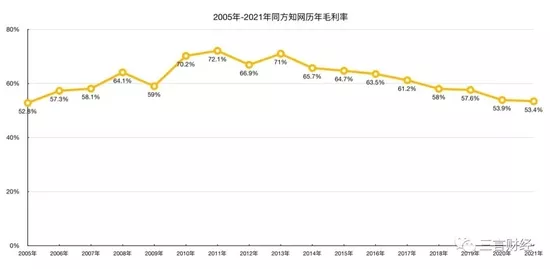
The figure above shows the gross profit margin of Tongfang HowNet, a subsidiary of Tongfang shares, disclosed in the calendar reports from 2005 to 2021. It is no exaggeration to say that the gross profit margin of HowNet has never been less than 50% in the past 16 years.
I dare not say that I know more, but I have worked for many years and read many company financial reports. The gross profit rate data of HowNet is a hanging blow to many Internet bosses.
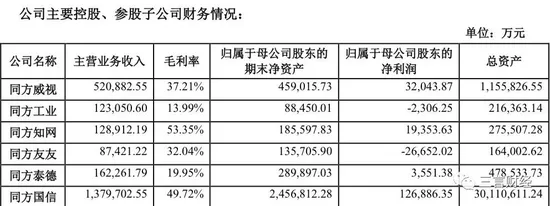
In 2021, Tongfang HowNet's revenue reached 1.29 billion yuan, with a gross profit margin of 53.35%; Net assets of 1.86 billion yuan and net profit of 190 million yuan; The total assets are 2.756 billion yuan.
In addition, in the three years from 2019 to 2021, HowNet has an average annual revenue of nearly 1 billion yuan and an average annual net profit of nearly 200 million yuan.
More importantly, HowNet is the fat that its parent company's Tongfang shares are difficult to cut off.
According to the 2021 annual report of Tongfang shares, Tongfang Zhiwang ranks fourth in terms of revenue and total assets among the six main subsidiaries of Tongfang shares, but its net profit ranks third and its gross profit ranks first, which is an important source of profit for Tongfang shares.
In addition, the performance of Tongfang shares over the years is inexhaustible and the growth is weak.
In 2021, the revenue of Tongfang shares was 28.456 billion yuan;
In 2015, the revenue of Tongfang shares was 28.447 billion yuan.
In fact, the average revenue growth rate of Tongfang shares from 2011 to 2020 is only 2.1%.
In 2016, the net profit attributable to the parent company of Tongfang shares was 4.3 billion yuan, the highest in history; However, deducting non net profit was a loss of 135 million yuan. Moreover, since then, the net profit deducted from Tongfang shares has never been regularized. In the first quarter of 2022, the company's cumulative loss exceeded 8.7 billion yuan.
Therefore, how can you say that you can cut the fat meat of HowNet?
Knowledge is priceless?
Everyone has the right to acquire knowledge, but it seems that they have to spend money.
In fact, the "academic monopoly" of HowNet is a global problem, and similar situations have occurred abroad.
Elsevier, one of the world's largest medical and other scientific literature publishing houses, publishes well-known academic journals such as the lancet, tetrahedron and cell. More than 200000 papers are published in journals published by Elsevier every year.
Timothy Gowers, a mathematician at the University of Cambridge and winner of the fields prize, has publicly announced a boycott of Elsevier because she can't stand the high fees Elsevier charges for individual subscribed journals.
Gowers' boycott soon won a lot of support, and we also set up a publicity website called "the cost of knowledge".
Similar to HowNet, the "boycott" of Elsevier also stems from high subscription fees. Participants announced that they would not publish papers in Elsevier and would not participate in any editing work of Elsevier.
Therefore, many foreign companies have begun to explore the free academic database. For example, Microsoft academic has provided more than 120 million free documents; Google academic is also a free academic search engine; Many colleges and universities in the United States have also launched open literature libraries.
There are also some academic websites that originally charged fees, but later chose to be free. For example, the US journal Nature opened all research papers in 2014 and provided free online reading.
In fact, there is no problem in the direction of running a database company like HowNet in a commercial and market-oriented way. Only by taking the road of sustainable development can we meet the interests of the supply side, the demand side and the platform side.
However, it is understandable that such services as academic database take the road of sustainable development with commercialization, but it also has a strong public welfare attribute. Academic development is the cornerstone of the development of human scientific and technological civilization.
Therefore, once it becomes a leader, it is necessary to use monopoly resources for profit and look to money for everything. Is such a "knowledge payment" really necessary?
Produced by Sanyan Finance
By Doraemon